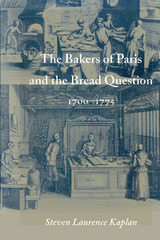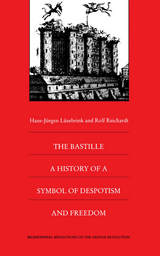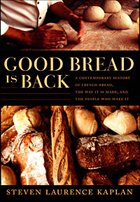3 books about Kaplan, Steven Laurence

The Bakers of Paris and the Bread Question, 1700-1775
Steven Laurence Kaplan
Duke University Press, 1996
In preindustrial Europe, dependence on grain shaped every phase of life from economic development to spiritual expression, and the problem of subsistence dominated the everyday order of things in a merciless and unremitting way. Steven Laurence Kaplan’s The Bakers of Paris and the Bread Question, 1700–1775 focuses on the production and distribution of France’s most important commodity in the sprawling urban center of eighteenth-century Paris where provisioning needs were most acutely felt and most difficult to satisfy. Kaplan shows how the relentless demand for bread constructed the pattern of daily life in Paris as decisively and subtly as elaborate protocol governed the social life at Versailles.
Despite the overpowering salience of bread in public and private life, Kaplan’s is the first inquiry into the ways bread exercised its vast and significant empire. Bread framed dreams as well as nightmares. It was the staff of life, the medium of communion, a topic of common discourse, and a mark of tradition as well as transcendence. In his exploration of bread’s materiality and cultural meaning, Kaplan looks at bread’s fashioning of identity and examines the conditions of supply and demand in the marketplace. He also sets forth a complete history of the bakers and their guild, and unmasks the methods used by the authorities in their efforts to regulate trade.
Because the bakers and their bread were central to Parisian daily life, Kaplan’s study is also a comprehensive meditation on an entire society, its government, and its capacity to endure. Long-awaited by French history scholars, The Bakers of Paris and the Bread Question, 1700–1775 is a landmark in eighteenth-century historiography, a book that deeply contextualizes, and thus enriches our understanding of one of the most important eras in European history.
Despite the overpowering salience of bread in public and private life, Kaplan’s is the first inquiry into the ways bread exercised its vast and significant empire. Bread framed dreams as well as nightmares. It was the staff of life, the medium of communion, a topic of common discourse, and a mark of tradition as well as transcendence. In his exploration of bread’s materiality and cultural meaning, Kaplan looks at bread’s fashioning of identity and examines the conditions of supply and demand in the marketplace. He also sets forth a complete history of the bakers and their guild, and unmasks the methods used by the authorities in their efforts to regulate trade.
Because the bakers and their bread were central to Parisian daily life, Kaplan’s study is also a comprehensive meditation on an entire society, its government, and its capacity to endure. Long-awaited by French history scholars, The Bakers of Paris and the Bread Question, 1700–1775 is a landmark in eighteenth-century historiography, a book that deeply contextualizes, and thus enriches our understanding of one of the most important eras in European history.
[more]

The Bastille
A History of a Symbol of Despotism and Freedom
Hans-Jürgen Lüsebrink and Rolf Reichardt
Duke University Press, 1997
This book is both an analysis of the Bastille as cultural paradigm and a case study on the history of French political culture. It examines in particular the storming and subsequent fall of the Bastille in Paris on July 14, 1789 and how it came to represent the cornerstone of the French Revolution, becoming a symbol of the repression of the Old Regime. Lüsebrink and Reichardt use this semiotic reading of the Bastille to reveal how historical symbols are generated; what these symbols’ functions are in the collective memory of societies; and how they are used by social, political, and ideological groups.
To facilitate the symbolic nature of the investigation, this analysis of the evolving signification of the Bastille moves from the French Revolution to the nineteenth century to contemporary history. The narrative also shifts from France to other cultural arenas, like the modern European colonial sphere, where the overthrow of the Bastille acquired radical new signification in the decolonization period of the 1940s and 1950s. The Bastille demonstrates the potency of the interdisciplinary historical research that has characterized the end of this century, combining quantitative and qualitative approaches, and taking its methodological tools from history, sociology, linguistics, and cultural and literary studies.
To facilitate the symbolic nature of the investigation, this analysis of the evolving signification of the Bastille moves from the French Revolution to the nineteenth century to contemporary history. The narrative also shifts from France to other cultural arenas, like the modern European colonial sphere, where the overthrow of the Bastille acquired radical new signification in the decolonization period of the 1940s and 1950s. The Bastille demonstrates the potency of the interdisciplinary historical research that has characterized the end of this century, combining quantitative and qualitative approaches, and taking its methodological tools from history, sociology, linguistics, and cultural and literary studies.
[more]

Good Bread Is Back
A Contemporary History of French Bread, the Way It Is Made, and the People Who Make It
Steven Laurence Kaplan
Duke University Press, 2006
In Good Bread Is Back, historian and leading French bread expert Steven Laurence Kaplan takes readers into aromatic Parisian bakeries as he explains how good bread began to reappear in France in the 1990s, following almost a century of decline in quality. Kaplan describes how, while bread comprised the bulk of the French diet during the eighteenth century, by the twentieth, per capita consumption had dropped off precipitously. This was largely due to social and economic modernization and the availability of a wider choice of foods. But part of the problem was that the bread did not taste good. In a culture in which bread is sacrosanct, bad bread was more than a gastronomical disappointment; it was a threat to France's sense of itself. By the mid-1990s bakers rallied, and bread officially designated as "bread of the French tradition" was in demand throughout Paris. Kaplan meticulously describes good bread's ideal crust and crumb (interior), mouth feel, aroma, and taste. He discusses the breadmaking process in extraordinary detail, from the ingredients to the kneading, shaping, and baking, and even the sound bread should make when it comes out of the oven. Kaplan does more than tell the story of the revival of good bread in France. He makes the reader see, smell, taste, feel, and even hear why it is so very wonderful that good bread is back.
[more]
READERS
Browse our collection.
PUBLISHERS
See BiblioVault's publisher services.
STUDENT SERVICES
Files for college accessibility offices.
UChicago Accessibility Resources
home | accessibility | search | about | contact us
BiblioVault ® 2001 - 2024
The University of Chicago Press









